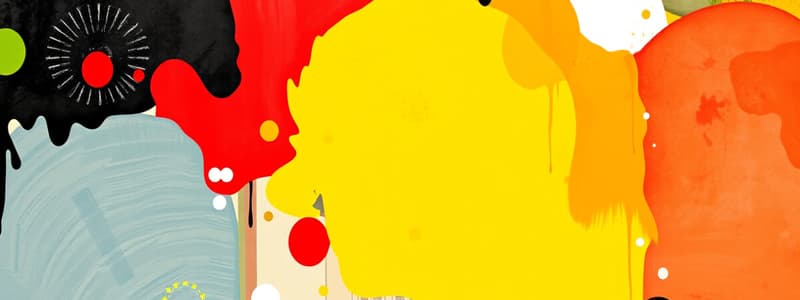Podcast
Questions and Answers
Which of the following is NOT considered a visual element of art?
Which of the following is NOT considered a visual element of art?
- Texture
- Color
- Unity (correct)
- Line
What best describes the term 'medium' in the context of art?
What best describes the term 'medium' in the context of art?
- The materials and tools used to create a work of art (correct)
- The methods used to apply art materials
- The arrangement of elements in a composition
- The distinctive characteristics of an artist's work
Which principle of design focuses on the visual weight distribution in a work of art?
Which principle of design focuses on the visual weight distribution in a work of art?
- Balance (correct)
- Variety
- Rhythm
- Emphasis
Which technique involves a specific method of applying art materials that can demonstrate an artist's skill?
Which technique involves a specific method of applying art materials that can demonstrate an artist's skill?
What is the primary purpose of emphasis in design?
What is the primary purpose of emphasis in design?
Flashcards are hidden until you start studying
Study Notes
Visual Elements of Art
- Line: The path created by a moving point, used to define shapes and convey movement.
- Value: The lightness or darkness of a color, crucial for creating depth and contrast.
- Shape: Two-dimensional areas defined by lines or color, can be geometric or organic.
- Color: Composed of hue, saturation, and brightness, evokes emotions and sets the mood.
- Texture: The surface quality of an artwork, can be actual (tactile) or implied (visual).
- Space: The area around, above, below, or within objects, contributes to composition and perspective.
- Time: In art, refers to the duration depicted or implied, often seen in moving images or sequential art forms.
- Motion: The illusion of movement within artwork, often achieved through techniques like blurring or dynamic lines.
Principles of Design
- Composition: The arrangement of visual elements within a work, impacting overall effectiveness and aesthetics.
- Unity: The harmonious interaction between elements, creating a cohesive whole that feels complete.
- Variety: Introduction of differing elements to maintain interest and engage viewers.
- Balance: The distribution of visual weight within a composition, can be symmetrical, asymmetrical, or radial.
- Emphasis (Focal Point): The area within an artwork that draws attention, often achieved through contrast or positioning.
- Rhythm: A visual tempo or beat created by repeated patterns, colors, shapes, or lines, guiding the viewer’s eye.
- Scale: The perceived size of an object in relation to other elements or the artwork as a whole.
- Proportion: The relationship of sizes between different parts of an artwork, crucial for realism and coherence.
Medium
- Refers to the materials and tools utilized to create art, including:
- Paint (oil, acrylic, watercolor)
- Drawing materials (charcoal, pencil, ink)
- Sculpture materials (marble, bronze, clay)
Technique
- Specific methods and practices for utilizing art mediums, reflecting the artist's skill and intention.
- Techniques can range from traditional methods to experimental approaches, influencing the artwork's final appearance.
Style
- The unique expression characterized by the artist's way of handling materials and visual elements.
- Distinctive traits can be associated with individual artists, specific art movements (e.g., Impressionism, Pop Art), or cultural periods.
Studying That Suits You
Use AI to generate personalized quizzes and flashcards to suit your learning preferences.




